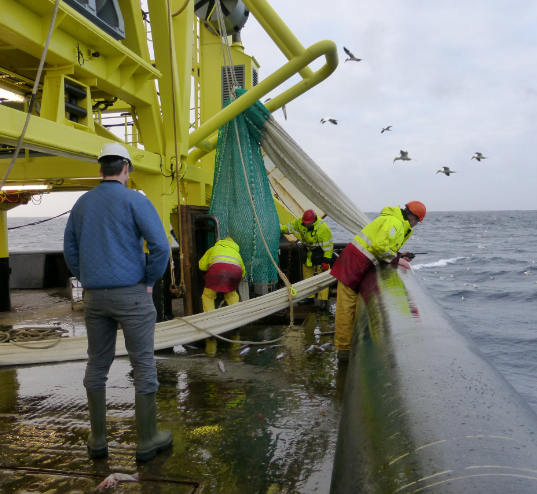Since
arriving back on transect the presence of blue whiting has been reasonably low,
particularly in the deep water (> 1000 m) and so we have only had the
opportunity to fish twice: Wednesday 1st and Saturday 4th.
Wednesday night we were accompanied by a number pelagic fishing vessels (French,
Norwegian, Faroese and Dutch (‘Frank Bonefaas’)) who’s fishing activities probably
caused blue whiting schools to scatter, making them difficult for us to catch.
The probable blue whiting layers looked broken up on the echograms. As the
fishing vessels dragged their nets through the water the blue whiting
dispersed. After a while the fish began to form more dense aggregations and so we
decided to fish. Both hauls
held no real surprises so nothing unusual to report although the second haul
consisted largely of small blue whiting as well as a bucket load of grey gurnards. The other
research vessels taking part in the survey have also been reporting low numbers
of blue whiting in most areas except for on the edge of the continental shelf.
Because of previous
changes to the cruise track on Friday we had the opportunity to pass Rockall rock
itself…unfortunately on the first pass there was low lying sea mist which
meant we only had about 1 mile visibility in any direction. On the second pass
it was pitch black so again no luck. So close yet so far….maybe next year.
As there is little to report in terms of survey
activities instead enjoy some pictures from haul number 6..!
 |
| Bringing in the nets. |
 |
| Soaring gannets. |
 |
| Cod end in view. |
 |
| Full of fish. |
 |
| Up they come. |
 |
| Dropping the fish below deck. |
 |
| Looking for an easy meal. |
 |
| Dive bomb. |
 |
| On the prowl. |
 |
| Gannet feast. |
 |
| Looking under water. |
 |
| Hake (Merluccius merluccius). |
 |
| Silver smelt (Argentina silus) |
 |
| Measuring the gurnards. |
 |
| Grey gurnards (Eutrigla gurnardus). |


















Geen opmerkingen:
Een reactie posten